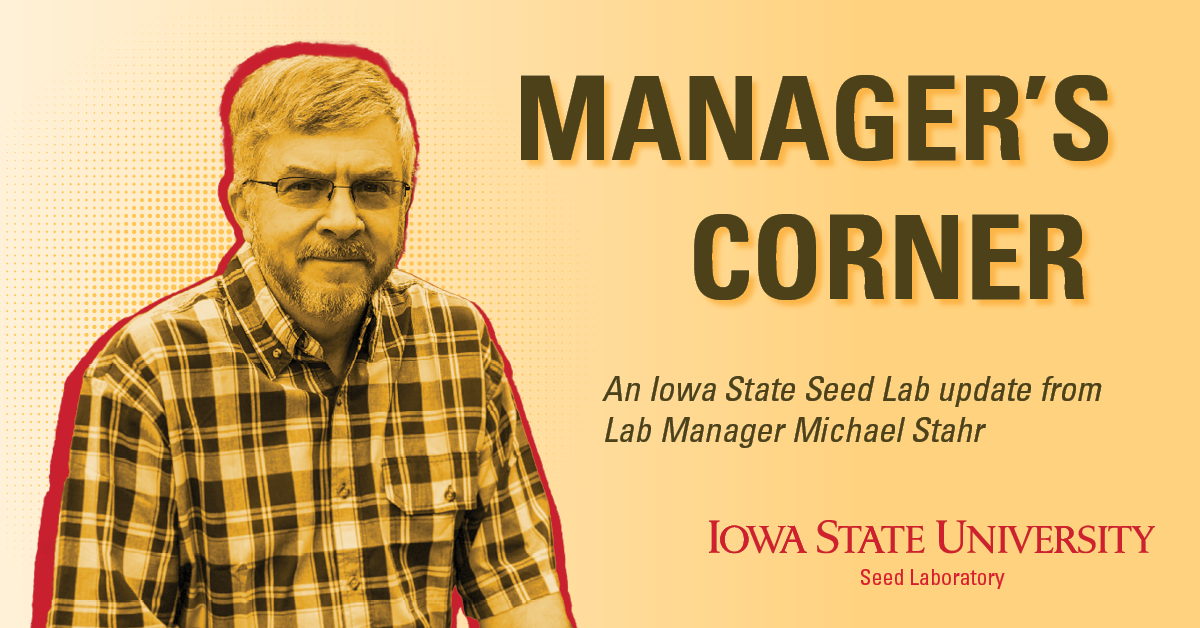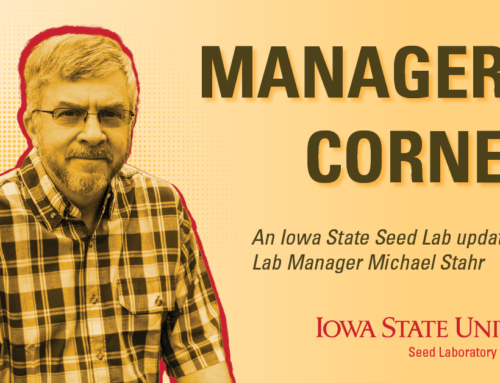As we move into our fall and winter testing season I would like to touch on a couple of items:
Submitting Seeds for Cover Crops
Please note the information about cover crop seeds under the picture of the guy who is next to a tray of corn on the lower part of the Seed Lab home page. If you will be planting seeds that you raised on your own land, then NRCS requires that a (mechanical) Purity Test and Germination Test. If you will be selling that seed to your neighbor, you must have a noxious weed exam done in addition to the purity and germination tests. Testing can be done at the Iowa State University Seed Lab or other nearby seed labs (South Dakota State, Illinois Crop, etc.). A minimum of 75 grams (~3 ounces) of cereal seeds are needed for a purity & germ test; 500 grams (a little over a pound) are need for a noxious weed exam.
How do I submit seeds and where do I send them?
https://www.seedlab.iastate.edu/submitting-samples-forms-e-transfer
How do oats, rye and wheat seed look so far?
It is very unusual for oat seeds to have problems with fungi and we don’t expect problems this year. Wheat, rye and triticale are a different matter as these types of seeds grown in Iowa are prone to problems with fungi, primarily Fusarium. Illinois Crop recently reported in its newsletter that there are problems in Illinois this year with Fusarium and Iowa looks to be in a similar situation. We haven’t received a lot of rye seed for testing so far, but that is changing as the phone is ringing off the hook with questions about cover crops.
Can anything be done with cereal seed that are of low quality because of Fusarium?
There are a couple of options, depending on the severity of the problem. (Dead seeds can’t be brought back!). The first is conditioning (processing) the seeds. Badly infected seeds tend to be lighter and thus an air screen cleaner or gravity table might help. Alan Gaul (agaul@iastate.edu, 515-294-6826) is charge of the seed conditioning unit at the Seed Science Center. He has many years of experience working with a wide range of species of seeds. A second option is to apply seed treatment. This isn’t always a readily available option for farmers as it isn’t likely that there is a seed company or other facility nearby that does custom treating. The best bet might be to check with the local county extension office. On the testing side of things, we can spread seeds further apart to reduce the chance of the fungi spreading in the germination test and we can increase the number of times we check the sample while it is germinating. Depending on our workload we can custom treat the sample of seeds to give an indication if seed treatment will help. Unfortunately, this isn’t a good option if a farmer doesn’t have a place to get seeds treated.
Whom do I contact at the ISU Seed Lab?
The cheery voice you hear when calling 515-294-6821 is likely to be Cherie Hill, but it could be Connie or Morgan. To contact ISU Seed Lab Customer Care by e-mail: seedlab@iastate.edu.
Lab Manager Mike Stahr: mgstahr@iastate.edu (best way to contact me) or 515-294-6826
ISU Seed Lab website: www.seedlab.iastate.edu
ISU Seed Science Center website: www.seeds.iastate.edu


